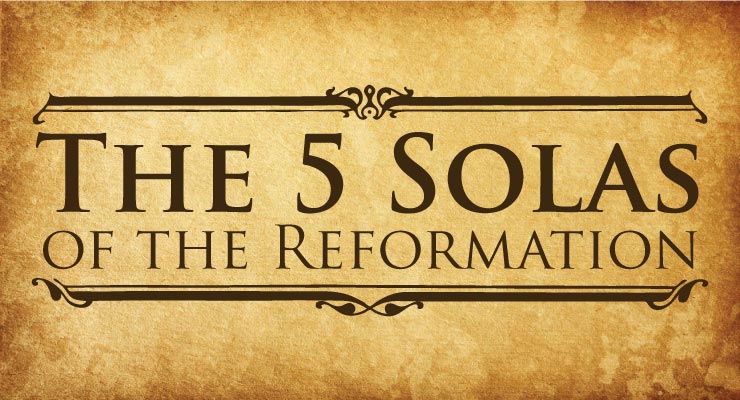The Reformation Part 1: The Five Solas

The Reformation (Part 1)
The Reformation was a 16th-century movement to reform the corruption and abuses in the Roman Catholic Church ending in the establishment of the Protestant Churches that exist today.
Those who protested the abuses and sought reform were called Protestants and/or Reformers. What were they seeking to reform?
Men like Martin Luther and John Calvin sought to return the Church to its Biblical roots regarding salvation in contrast to the Roman Catholic Church’s man-made system of works-salvation. They summarized their theological convictions in what has come to be known as “The 5 Solas of the Reformation”. The five solas are five Latin phrases (or slogans) that teach the core principles of the Reformers.
The Five Solas of the Reformation:
- Sola Scriptura: The Scripture Alone is the final authority for faith and practice. Thus no council, denomination, pastor, elder, board, book, school or ministry has the final say in matters of faith, doctrine, practice or belief. Our conscience is chained to the word of God.
- Sola Fide: It is by Faith Alone apart from all human works, apart from all human merit, apart from any agency. There is no other plan of salvation which is acceptable to God. The righteousness of God imputed to a believing sinner is the only means of justification.
- Sola Gratia: God’s Grace Alone can save a person. God’s grace is both his stance toward us, (namely his graciousness) and the desire and power to do his will (His enablement). When we affirm that we are saved by grace alone we mean not only that God has given us an unmerited gift or favor (his graciousness) but also and most importantly, he has overcome our depravity and inability to respond by his grace (the desire and power to do his will).
- Solus Christus: Christ Alone is the mediator between God and man and the only priest anyone needs for salvation. He is the only person who can save us and the only way to be saved and justified.
- Soli Deo Gloria: The Glory of God Alone is the purpose for which all things were and are created. God’s greatest purpose in all that he does is to bring glory to Himself. In short, the chief end of man is to glorify God and enjoy him forever.
For the next 15 weeks, leading up to the 500th Anniversary of the Reformation on October 31st, I will be reflecting on key principles taught by the Reformers. Next week I look at the acrostic TULIP, also known as “The 5 Points of Calvinism”.
© Dave Doyle 2017
More in Pastor's Blog
February 15, 2024
I Know YouJanuary 15, 2024
Waste Not Want NotDecember 15, 2023
Yours Sincerely